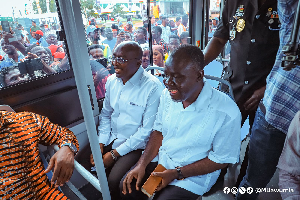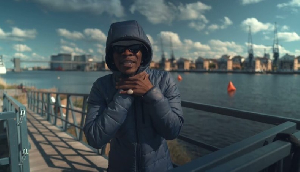ACCRA, Ghana ? At least 300 extra police and army officers have been moved to Ghana's northern regions as tensions between two contending political parties have boiled over in the run-up to the nation's third democratic election Tuesday.
A 14-year-old boy has been killed, and three persons have been injured in the violence. Political activities, including radio call-in shows, were banned in the northern regions for two weeks as police struggled to restore calm.
"Before the ban, there wasn't one political event organized in [the area] that didn't end in disturbances or violence, even to the extent of loss of life," said Charles Bintin, a deputy regional minister who also sits on the region's security council.
The ruling, right-leaning New Patriotic Party of President John Kufuor is hoping for a second term in office, while the National Democratic Congress is hoping to sway voters by picking apart the ruling party's record on matters such as development.
Mr. Kufuor, 65, won his first term in December 2000 after two-time coup leader and president of 19 years Jerry Rawlings ended his rule because of a two-term limit written into a new constitution.
Emotions already are running high in the northern regions, where towns have been divided along tribal lines after the beheading of a tribal king, Ya Na Yakuba, two years ago.
Police say the fears of violence are not unfounded. During the two-week ban, police conducted a series of raids and uncovered a cache of homemade weapons.
However, Ben Ephson, who monitors the elections as part of the nongovernmental organization Ghanalert, predicts that they will be peaceful.
"Ghana has the lessons of Liberia and [Ivory Coast] to guide us," Mr. Ephson said. "This country is bigger than any political party."
The elections this year are largely about the economy. The price of cocoa, which accounts for nearly two-thirds of Ghana's exports, is at an all-time high.
In 2001, the Kufuor government decided to seek "highly indebted poor country" status to win huge write-offs in Ghana's debt. As part of the deal with the World Bank and the International Monetary Fund, the government spent $20 million on developmental projects such as electricity, roads and schools.
But little of the economic upswing is being felt on the ground.
According to the latest health survey, infant mortality rates are worsening, and a report by the United Nations shows that about 40 percent of the population is living in poverty. At least a third of the population cannot meet its basic nutritional needs.
"From these statistics, a majority of people are not doing better," said Kojo Yanko, director of the African Institute of Journalism and Communication.
Although the government has made it a priority to connect the far corners of Ghana with paved roads and has worked at linking small communities onto the country's fledgling electricity grid, people can't afford to pay the bills, Mr. Yanko said.
General News of Sunday, 5 December 2004
Source: THE WASHINGTON TIMES
















